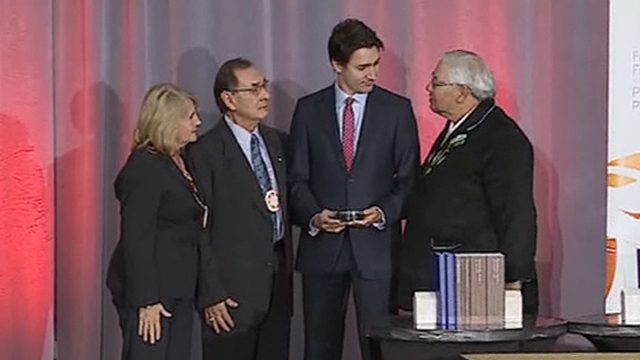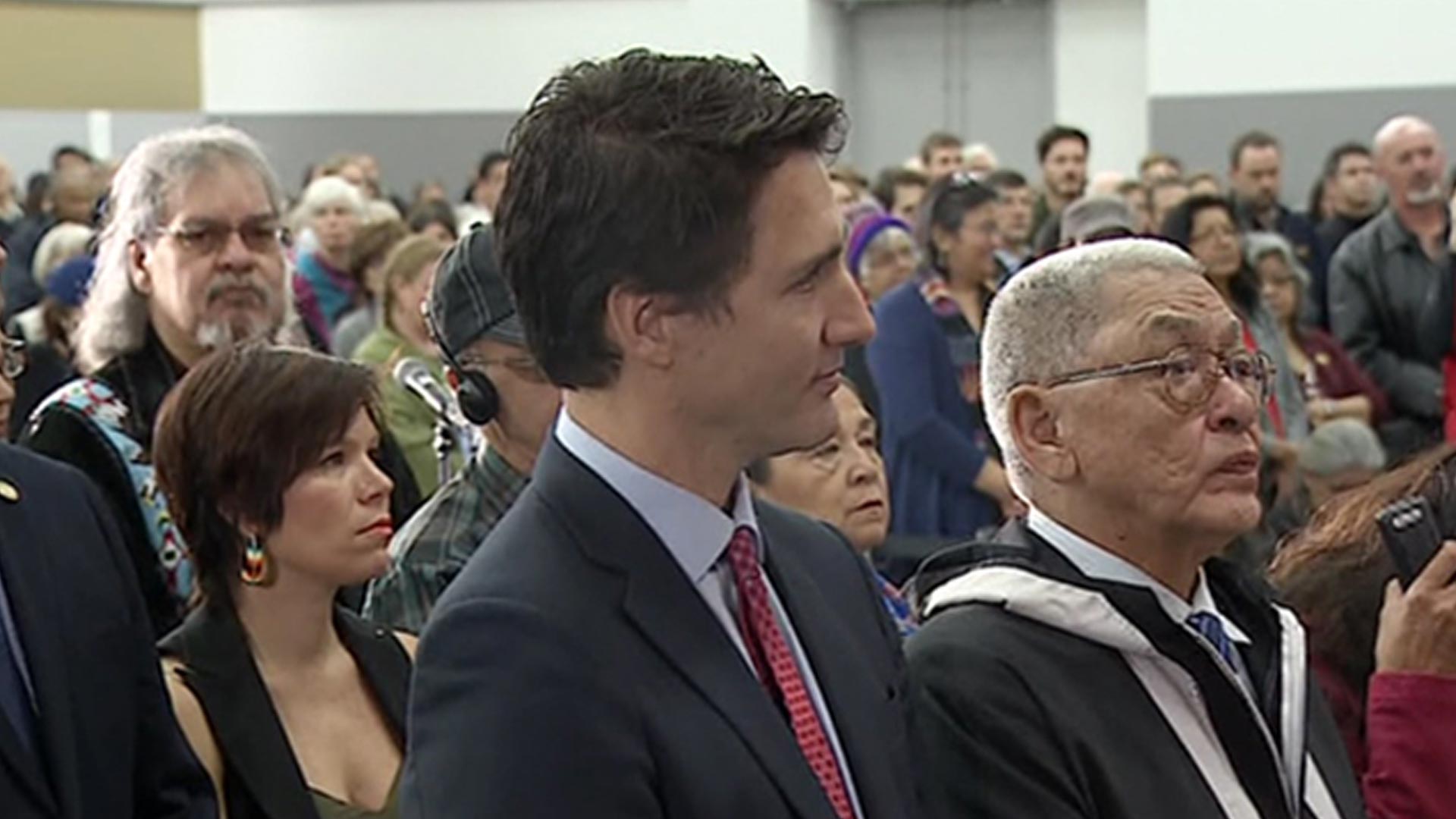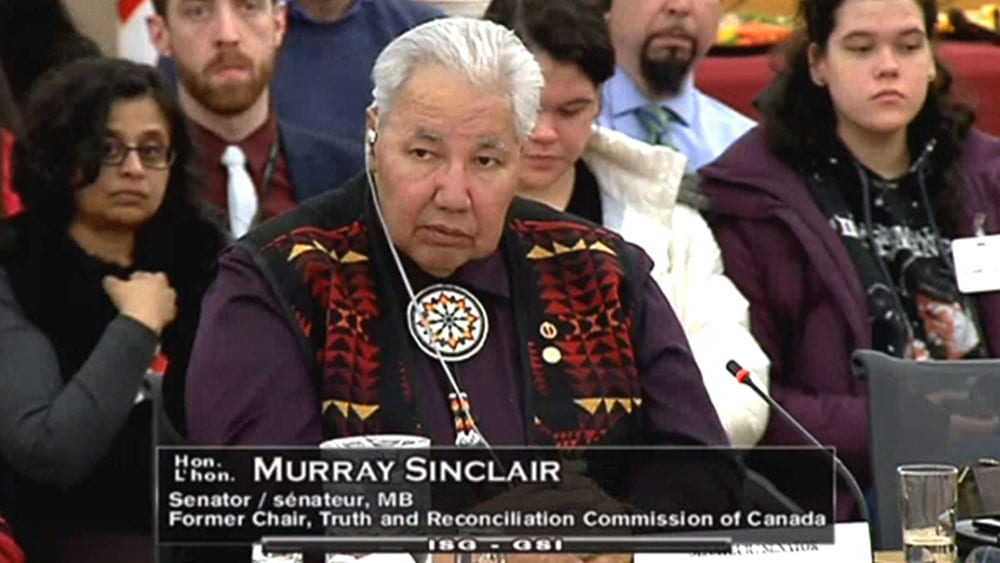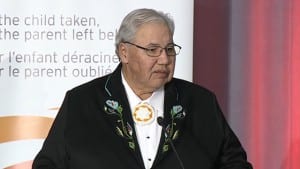
(Left to right: Truth and Reconciliation Commissioner Marie Wilson, Commissioner Wilton Littlechild, Prime Minister Justin Trudeau, Chair Murray Sinclair on Tuesday during ceremony unveiling commission’s final report. APTN/Photo)
APTN National News
During an emotional ceremony Tuesday marking the end of Truth and Reconciliation Commission’s six year journey through the darkness of the over century-long existence of Indian residential schools, Prime Minister Justin Trudeau asked the forgiveness of Indigenous peoples in Canada and committed the full weight of the federal government to refashioning a new relationship.
The Truth and Reconciliation Commission (TRC) unveiled its final report during the ceremony in Ottawa marking its final act in an over six year process that saw it hold cross-country hearings gathering the testimonies of about 7,000 survivors. While the report’s primary findings, along with its 94 “calls to action,” were previously released in June, the hefty volumes provide the full breadth of data supporting the TRC’s conclusions.
Trudeau, who was the first prime minister to attend a TRC event, told the room of about 800 people, which included residential school survivors, their families, cabinet ministers and church leaders, that he was committed to nothing less than a “total renewal” of the relationship between Indigenous peoples and Canada.
“There is reason for hope today. We find ourselves on a new path working together toward a nation-to-nation relationship based on recognition of rights, respect, cooperation and partnerships,” said Trudeau. “Let me say it once again, I give you my word, that we will renew and respect that relationship.”
Trudeau is set to meet with Indigenous leaders from five National Indigenous organizations representing First Nations, Inuit and Metis Wednesday on Parliament Hill to take the first steps down this path.
The prime minister said his government would begin the work of designing a “national engagement strategy” to develop a “national reconciliation framework” that will include a formal response to the TRC’s calls to action. The work will include the provinces and territories along with Indigenous leaders, said Trudeau.

While there was “reason for hope” Tuesday, the TRC spent the past six years delving into a history where little hope gleamed in the lives of the about 150,000 Indigenous children who were processed through the over century-long existence of the schools which were run by Christian churches on behalf of the federal government.
At least 3,200 children died at the schools, but the actual number is larger, closer to 6,000 if not higher, but extensive gaps in records related to deaths in the system may keep a final and conclusive tally hidden forever.
In a portion of her speech directed at the children who died in the residential school system, TRC Commissioner Marie Wilson said much remains to be told about their histories.
“We know that a quarter of you left this world without the dignity of having your name recorded. A third of you left without anyone noting whether you were a boy or a girl. And fully half of you passed on without the cause of death being recorded,” said Wilson.
In the majority of the deaths, the bodies of these children were never returned to their home communities and many are buried in cemeteries that have since been lost time.
Within this darkness, within this pain, amid deep and lasting wounds, not only to the individuals who attended the schools but also of their families and wider communities, there existed a light carried by the very children who managed to survive the government-created system, said Sinclair.


“Ours was going to be a journey of discovery that would be filled with challenge, with pain, with horror tinged with sadness and despair. And, perhaps surprisingly by those who were there, accompanied by laughter, by joy and by courage,” said TRC Chair Murray Sinclair. “This story is about the resilience of children. It is about surviving. It is a story not only about their resilience, but by their courage and their ability to support each other…Their love of life, the ability to embrace whatever it took to return home and their ability to bring us to this day.”
Sinclair said already the TRC has been met by responses from all sectors of Canadian society committed to the work of reconciliation.
Sinclair said KAIROS, an organization uniting Canadian churches, has launched a campaign calling for residential schools, treaties and Indigenous contributions to Canada be made a mandatory part of all education curriculums. Sinclair said the Canadian Association of Statutory Human Rights has committed to promoting the TRC’s 94 calls to action while universities and provinces are already incorporating the Indigenous history as a mandatory element in education curriculums.
Sinclair also held out hope that Pope Francis will finally apologize for the Catholic Church’s role in residential schools.
Sinclair said the federal government still needed to deal with claims from Indian day school survivors, with Metis survivors and residential school survivors from Newfoundland and Labrador who were not part of the multi-billion dollar residential school settlement agreement that gave birth to the TRC.
Archbishop Gerald Pettipas, who represented the various Catholic entities that ran the schools, said because the Church operated the majority of schools it bore a great responsibility for what was done to Indigenous children.
“When the reality of the schools began to dawn upon us we began to realize what was done,” said Pettipas. “Even for all those good intentions, it wasn’t always good that came of it. We have to live with that, we have to try to deal with it.”
Indian residential school survivor Eugene Arcand said it was now up to each and every Canadian to take part in the task of reconciliation.
“No one can say, unless you live under a rock or in a cave, that you don’t know about this anymore,” said Arcand, who carried a photograph of 32 of his residential school classmates throughout the TRC process. “Canada, this is your right of passage. If you really are citizens of this country, take that next step, get out of that protective environment we were supposedly put in and take a risk and take that call to action.”
Residential school survivor Madeleine Basile encapsulated the final failure of residential school system and its aim of eradicating Indigenous culture.
“I am a survivor,” said Basile as she held an eagle feather aloft. “I am a survivor.”
The Trudeau government has pledged to implement all 94 calls to action.
The Conservative party, now the Official Opposition, wants the government to reveal how much this will cost.
@APTNNews











Great work done by TRC. Weak apology from the bishop though “good intentions” ya right